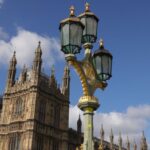The Bank of England notes increasing evidence that companies react to higher national insurance contributions by reducing hiring, working hours and wages, said Andrew Bailey, by pointing out on the job market.
The Governor of the BOE said Thursday that interest rate were likely to stay on a progressive lower trajectory, predicting that growth will slow down after a strong first quarter.
The central bank is expected to maintain a “restrictive monetary policy position” because it sought to make the remaining persistence in inflationary pressures, he said in a speech at the British Conference of Chambers of Commerce in London. But he underlined the indicators of the drop in demand for labor and hiring intentions and evidence of a “significant drop” of wages growth in the coming year.
“With moderate growth and a softer labor market, a wider spring margin in the British economy will support a continuous disinflation of the domestic economy and a progressive inflation return in line with the target of 2% while we look beyond the short-term increase,” said Bailey.
Commercial organizations said they were hardly affected by the October Rachel Reeves budget, including an increase in national employers' insurance contributions.
THE Boe said there were several ways of which companies could absorb this tax increase, including a drop in beneficiary margins, higher prices for customers or by reducing wages and efforts to reduce employment.
“When we ask companies, they tend to check all the boxes,” said Bailey. “It is understandable. Business margins are the first to adapt. But I am starting to hear a little more evidence of adjustments by salary and employment. ”
The Governor of the BOE said that continuous efforts were necessary to lower inflation, because he reiterated that, given the “bilateral risks” to inflation, “a progressive and meticulous approach to the additional withdrawal of monetary policy remains appropriate”.
But he suggested that recent increases in inflation caused by higher vehicle accuracy rights and increases in water and energy bills should not last.
“We do not expect them to rekindle interior inflationary pressures via new second-round effects, because we saw it after the major world shocks that pushed inflation at much higher levels in 2021 and 2022,” he added.
Despite a stronger than expected 0.7% increase In the GDP of the first quarter, the BOE was expecting a “more moderate” growth rate in the coming quarters, said Bailey.
He said that the growth of the first quarter was driven by strong results for the “volatile components” of GDP in March, including the possible frontage of activity before the increase in property tax and vehicle accuracy rights.
An increase in trade before the prices of US President Donald Trump may also have led to a temporary increase in activity.
And although companies' investment is firm in the first months of the year, companies said to the BOE that “increased uncertainty and a low demand prospect weighed on investment intentions,” said Bailey.


